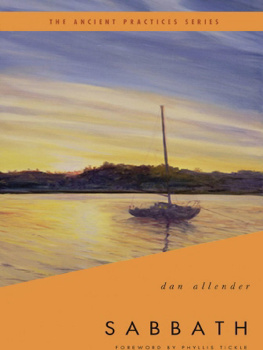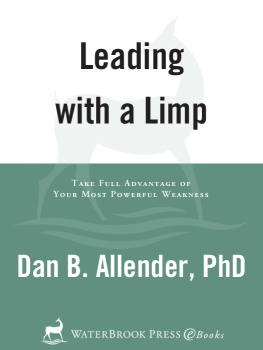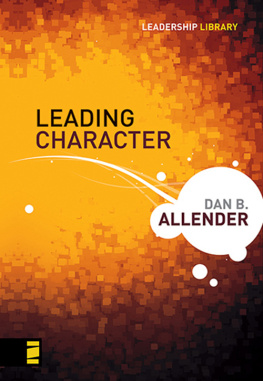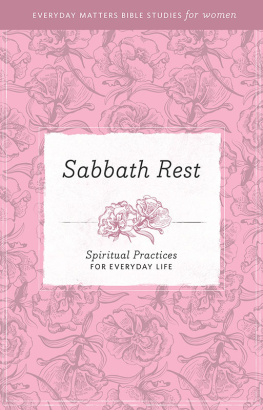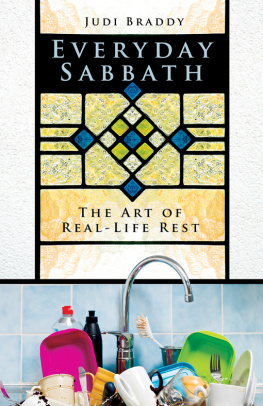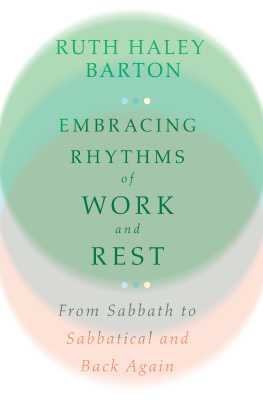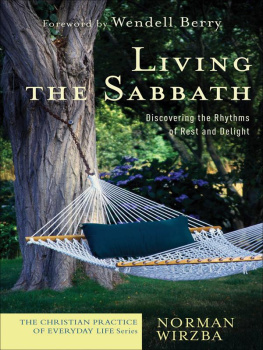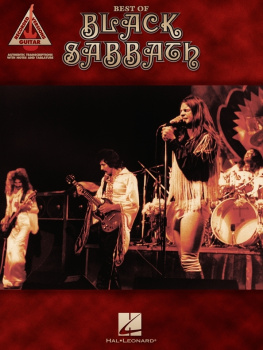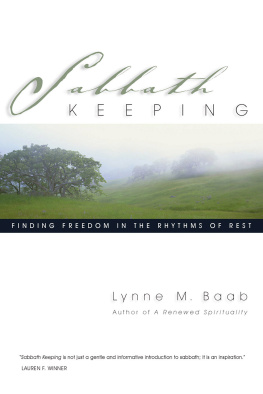SABBATH
SABBATH
dan b. allender
2009 by Dan B. Allender
All rights reserved. No portion of this book may be reproduced, stored in a retrieval system, or transmitted in any form or by any meanselectronic, mechanical, photocopy, recording, scanning, or otherexcept for brief quotations in critical reviews or articles, without the prior written permission of the publisher.
Published in Nashville, Tennessee, by Thomas Nelson. Thomas Nelson is a registered trademark of Thomas Nelson, Inc.
Page Design by Casey Hooper.
Thomas Nelson, Inc., titles may be purchased in bulk for educational, business, fund-raising, or sales promotional use. For information, please e-mail SpecialMarkets@ThomasNelson.com.
Unless otherwise noted, Scripture quotations are taken from the Holy Bible, New Living Translation. 1996. 2004. Used by permission of Tyndale House Publishers, Inc., Wheaton, Illinois 60189. All rights reserved.
Scripture quotations marked NIV are taken from HOLY BIBLE: NEW INTERNATIONAL VERSION. 1973, 1978, 1984 by International Bible Society. Used by permission of Zondervan Publishing House. All rights reserved.
Library of Congress Cataloging-in-Publication Data
Allender, Dan B.
Sabbath / Dan Allender.
p. cm.
Includes bibliographical references.
ISBN 978-0-8499-0107-2 (hardcover)
1. Sunday. 2. RestReligious aspectsChristianity 3. Sabbath. I. Title.
BV111.3.A44 2008
263'.3dc22
2008037265
Printed in the United States of America
09 10 11 12 QW 5 4 3 2 1
To my Naver River fishing friends
Sabbath rhythms, tight lines.
Andrew Allender, Stan Bogden, Matthew Carucci,
Ron Carucci, Tracey Dean, Andy McCoy,
Matt McCoy, Mike McCoy, Stan Smartt
CONTENTS
THE ABRAHAMIC FAITHS OF JUDAISM, CHRISTIANITY, AND Islam share a common religious ancestry, not only in their claim to unbroken descent from the same patriarch but also in their adherence to a fixed set of seven religious concepts and practices, at least two of which were established before Abraham was even Abraham.
Each of the three communions has continued to retain those same seven over the centuries, even as each has spent centuries as well as enormous energy in enculturating them. The processes by which each faith group has adapted tithing, fasting, fixed-hour prayer, Sabbath observance, adherence to the liturgical year, sacred pilgrimage, and participation in the sacred meal to accommodate the ways of their own varying cultures makes for some intriguing moments in religious history; but none of the seven has enjoyed so rich or varied a genesis as has that of the Sabbath and its proper observance.
Interestingly enough, the discipline of keeping one day holy unto the Lord is the only one of the Abrahamic practices that is commanded as such. That is, of the seven, it is only Sabbath-keeping that was included at Sinai as a part of the decalogue or Torah. The question of just exactly what does and does not constitute proper Holy Day observance likewise has dominated religious conversation far more than has any concern with the other six practices. Sabbath, by whatever name and in whatever age, matters.
I think I did not really appreciate the depth of those circumstancesmuch less the implications of themuntil I began to read the manuscript and permutations of manuscript that led to the book you now hold in finished form in your hands. Admittedly, the genius of this book lies in part in Dan Allenders obvious devotion to and belief in Sabbath keeping. Much of it undoubtedly lies also in the sheer breadth of his knowledge, as a professional theologian, about what he is talking about. But beyond those two things, informing as they obviously are, is Dan Allenders affection for something that he feels has shaped him and which he relays in these pages with a kind of intimacy that, at times, is almost poetry and is always affectionate.
I never thought of shabbos as a thing of delight before, never thought of it as a time for the soul to play and take its leisure, never before thought of it as a time of training for learning to walk again, as once we did, in familial communion with the Father. What has happened for me in working with this manuscript is a transposition of the Sabbath from rule and commanded observance to holy romp and secret playground where each visit only adds another level of delight.
Whether or not such a transposition will happen for all who read this book, I of course can not say. All I can say is that I am deeply grateful that it has happened for me, and I hope most earnestly it will be so for you as well.
Phyllis Tickle, General Editor
I AM INDEBTED TO A HOST OF PEOPLE WHO BRING ME great joy:
First, to my publisher, Matt Baugher, who was once my agentdear friend, bless you for thinking of me when this project became available. Your kind words have been a feast of delight. As well, to Sealy Yatesalready your willingness to listen to my dreams is an immense gift.
To the Mars Hill Graduate School Sabbath class, including my glorious coteacher Rob Gillgristyour hard questions, invaluable presentations, and joy in the Sabbath gave me courage and allowed me to test the content and tone of this material.
Thank you to Heather Abbott, Michael Audas, Erin Banasik, Justin Barrante, Tamara Bolding, Christy Broyles, Elise Cadwell, Carol Carson, Andrew Chamberlin, Rene Cline, MLyss Fruhling, Catherine Golden, Tracy Kouns, Lindsey Leitner, Patrick Love, Alison May, David Michalowski, Jessica Miller, Angela Kirby Nixon, Lisa Quinlan, Samuel Rainey, Joshua Reynolds, Christopher Roberts, Shannon Stauffer, Kathleen Stewardson, Carin Taylor, and Kelsie Thimsen.
To my dear friends, Pam Davis, Scotty Smith, and Elizabeth Turnagethank you for your careful reflections, critique, and joy in offering your heart to me.
To Ron Carucciyour time helping me wrestle through the unsettling questions that were the impetus to this book was invaluable, like all our labor.
To my young, gifted, and wise researchers, Phillip Nellis and Rachel ClintonI cannot count the number of times I heard you make connections, ask questions, and offer thoughts that shaped this book. It was the rare experience with you: a delicious blend of academic, relational, pastoral, theological, and philosophical delight. Thank you, thank you. Your brilliant hearts and wise minds made this process a time of great play.
To my wife, Rebeccait is odd, isnt it? Decades ago you invited me to receive the day, and I smiled and ignored you. How could you offer me such honor, delight, and courage after I let the gift reside on a shelf and missed your heart? I believe it is because you breathed Sabbath beauty and redemption until my exhaustion and emptiness necessitated change. I grieve it took so long; I celebrate that we have known a new kind of rest that I long to live until the eternal Sabbath breaks fully into this world. You, my love, are the delight of my days.
ONE NIGHT IN A REFUGEE CAMP IN THAILAND, A HALFmile from the Burma border, taught me what I most want to say about the Sabbath. My wife and I were visiting the Mai Sot camp, which houses fifty thousand refugees who fled from the genocidal Myanmar government in order to study under Dr. Simon, the president of a Bible college and seminary in the camp. In the eighteen years he has been in exile from his home in Burma, Dr. Simon has trained more than one thousand graduates from India, Burma, Thailand, Vietnam, Laos, and Cambodia.
I spoke at a midweek church gathering of the Karen people that lasted two hours with men, women, and children who sang some of the most beautiful melodies I have ever heard.
After the service, we sat leisurely with Dr. Simon for three hours. We ate simple, abundant, and delicious food and heard the story of their glory and their suffering. During World War II, the Karen people were selected by the British as royal soldiers and promised protection and honor for their service to the crown. Instead, the British left Burma and refused to meddle in the affairs of that decolonized nation. Soon thereafter, the ruling party began to steal their lands, violate the women, and kill their men. The devastating effort of the Myanmar government to wipe the Karen people off the earthone of the least-publicized atrocities of the twentieth centuryhad begun.
Next page
